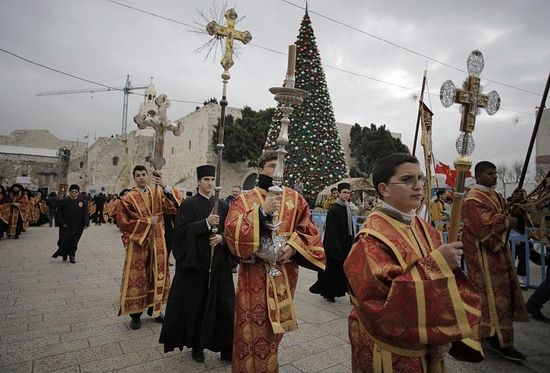This article was originally published here
With Christmas approaching I’d like to tackle the false notion that Christmas is a pagan holiday that Christians shouldn’t celebrate or engage in. This belief is frequent in some fringe Protestant groups, Atheists, as well as the Hebrew Israelite movement, but the place that popularized it the most is a film called Zeitgeist. I also seek the explore how we got some of the Christmas customs such as cutting down the tree, etc. May my words be edifying and in truth to the best of my ability. In the name of the Father, the Son, and the Holy Spirit. Amen.
Note from the Editor: Though this article was published about a week before Christmas, I found this post only a few days after our Holy weekend, and that not soon enough. It appeared that many folks were over eager to denigrate the festivities of the Advent of our Lord and miss the entire point of the few articles I published that proclaimed Christ in Christmas. I hope that this post can help to give a more concise response to the detractors, hecklers, and doubters. – Richard Osgar
Aforementioned articles:
– On the Miracle of Christs Birth
– Remembering the Reason for Christmas
First Claim – “Christmas Day Is Just The Roman Festival of Sol Invictus.”
Sol Invictus was a Roman festival that worshiped the sun, of which it’s attested that Christmas is based on it, this is a claim made in the Zeitgeist film. According to this theory, Christians attempted to Christianize the pagan festival by putting Jesus’s birth on it, or the even more boldly claimed is that it’s a grand conspiracy to deliberately make Christianity pagan by doing so. However, I would employ any person making this claim to find evidence before the 12th century that asserts this notion. You won’t find one.
St. Augustine, St. Ireneaus, St. John Chrysostom, and even Tertullian all mark March 25th as the date of the Virgin conception, naturally, nine months past this would equal December 25th. “For He (Jesus) is believed to have been conceived on the 25th of March, upon which day also he suffered; so the womb of the Virgin, in which he was conceived, where no one of mortals was begotten, corresponds to the new grave in which he was buried, wherein was never man laid, neither before him nor since. But he was born, according to tradition, upon December the 25th.” (1).
The festival doesn’t exist until the year 274, we have the testimony of church fathers such as St. Ireneaus, St. Hippolytus, and more, even with the non-church father Tertullian all using this date several decades before Sol Invictus existed. Case closed.
2nd Claim: “Christmas Is Based On Saturnalia.”
This sweeping generalization misses the mark in a couple of areas. Saturnalia was the week-long event leading up to December 25th, it would occur between December 17th and end on December 23rd in honor of the ‘god’ they worshiped, Saturn. Just because this week falls close to Christmas does not mean it’s pagan. That’s like saying if your birthday is on July 4th that you must therefore belong to every organization that involves Independence Day.
Saturnalia does have an older precedent than Sol Invictus does, tracing back to around 100B.C. As stated above, the dates are not the same which is the biggest glaring conundrum for this theory. Secondly, the practices are much different; Christmas trees, mistletoe (comes from ancient Greeks before the Roman adoption), Christmas lights, and more; none of these come from Saturnalia. There is an overlap, however, between gift-giving, caroling, and wreaths but what was done on Saturnalia that Christians don’t do? A prominent one was legalized gambling, as well as drunkenness, walking about everywhere naked, among some other abominable examples which Christians do not participate in (or at least aren’t supposed to), let alone promote. See source 5 for more information.
Third Claim: “Jeremiah 10 Forbids The Use Of Christmas Trees.”
“This is what the LORD says: “Do not learn the ways of the nations or be terrified by signs in the sky, though the nations are terrified by them. For the customs of the peoples are worthless; they cut a tree out of the forest, and a craftsman shapes it with his chisel. They adorn it with silver and gold; they fasten it with hammer and nails so it will not totter. Like a scarecrow in a melon patch, their idols cannot speak; they must be carried because they cannot walk. Do not fear them; they can do no harm nor can they do any good.” – Jeremiah 10:1-5
This argument asserts that the above verse condemns the use of Christmas trees and every Christian who uses one is sinning against God. This is a serious accusation, and a false one when looked at the context of the verse. The “decorated tree” being referred to is an idol, as is plainly stated in the text. The book of Exodus speaks of idols to Asherah in the form of a tree. Asherah was a pagan deity.
Christians aren’t falling down and worshiping this literal tree as God Himself. This is what is meant by an idol. Jeremiah 10 would only apply if people were worshiping the tree as God which is what many pagans did. The traditional meaning of the Christmas tree for Christians has become associated with St. Boniface in the 700’s, who upon seeing a village of pagans worshiping a tree as God, proceeded to cut it down in front of all of them. These pagans frequently ritually sacrificed a human being during these events too, which St. Boniface stopped by his interruption. Tradition holds that the entire village then converted and were baptized into Christianity. Maybe even earlier, we have the Christmas tree being a symbol of the tree of life from the Garden of Eden, which was returned to us when Christ was born for He is life itself. The light we place on top of the tree represents the spiritual light, or the light coming into the world (Jesus) illuminating everything. Traditionally, it was not ornaments that we hung on trees, but actual fruits such as apples. These spiritual fruits were revealed to us by Christ and they are fruits that we hope to bring forth in ourselves with His grace & light.
Fourth Claim: Santa Is An Anagram For Satan, Santa is Satan
There is a theory that Santa is an alias for Satan as if you rearrange the letters it makes it so. There are some pastors (such as Rick Scarborough) who teach this to their congregation. Firstly, the word Santa Claus we can trace to the Dutch word Sinterklaas, which is used for Saint Nicholas, Bishop of Myra who was at the First Ecumenical Council. Sinter became Santa, Klaas became Claus.
Dutch immigrants brought over this tradition around the 16th century and it morphed into what we know today as Santa Claus. Santa Claus isn’t Satan, it’s referencing St. Nicholas who frequently aided the poor, there are varying traditions; one saying he had a sack of gifts that he would go from house to house giving them to the poor children whose families could not afford anything. His elaborate outfit was theorized because he was a bishop in his vestments. Another tradition saying St. Nicholas threw a stocking full of gold coins (late at night) through the window of a man who was poor and could not afford to provide for his three daughters, the man was considering allowing them to become prostitutes so they could survive. St. Nicholas threw bags of gold to prevent this from happening, as well as for the family to remember God provides. He did this late at night to avoid fame, self-glory, etc. The bags are said to have landed before the fire and were found there, so that is why we hang stockings above the fireplace.
It is fair to say our modern conception of St. Nicholas has been distorted, primarily in that Christmas has become about receiving rather than giving. Children are taught “what did you get?” rather than “what did you give? What did you help your neighbor with?” St. Nicholas represents alms-giving, Santa Claus has become to represent consumerism.
So, while I agree that what we know as Santa has been distorted from the actual St. Nicholas, it does not mean that there is no real positive origin to it. Furthermore, the anagram argument is poor. If Santa means Satan by evidence of rearranging of letters then ‘live’ actually means ‘evil’, so it’s evil to live by the same logic. This is of course, ridiculous. There is a better argument in pointing out how St. Nicholas and Santa may differ. May we all call St Nicholas to mind and give alms to those in need! For it is better to give than to receive (Acts 20:35).
In closing, this debate on whether Christmas is pagan isn’t really a debate at all, it’s simply inaccurate. For Christians, the message is clear, Christmas is about celebrating the birth of Our Lord Jesus Christ. His birth marks the Light that has come into the world. He Who is outside of time and space came into time and space, the Word became flesh. Many men want to be god but God Himself became man. The incarnation gives us the ability of deification, not only of ourselves but of the world itself. He chose to be like us to show us how to be like Him. Christmas is a joyous celebration of this, God in His infinite love, loves us more than we even know how to. That is what we celebrate in Christmas. Jesus Christ, the God-Man, The Uncreated Light.
I would also like to remind everyone if you enjoy my content, would like to support me, and get access to even more content please consider signing up for my Patreon, click here. I would be immensely thankful.
Sources:
- On The Trinity; St. Augustine.
- Orthodox Study Bible.
- Pope Benedict XVI Catechesis on “Saint Boniface, the Apostle of the Germans”, Church Fathers and Teachers – From Saint Leo the Great to Peter Lombard (San Francisco: Ignatius Press, 2010), 80.
- Loukianos of Samosata (lived c. 125 – after c. 180 CE), ‘Saturnalia.’ Translated from Syrian by F.G. Fowler.
- Orthodox Wiki – St. Nicholas of Myra.
- St. Nicholas Center, Virginia Theological Seminary, 2002.





